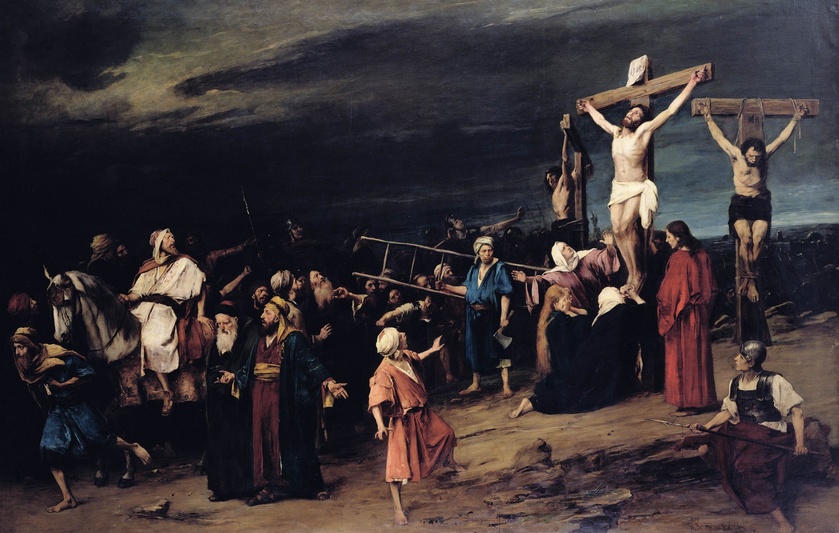"Nostra Aetate," the Declaration on the Relation of the Church to Non-Christian Religions, is a significant document from the Second Vatican Council that addresses the Catholic Church's relationship with people of other faiths, including Judaism.
Why am I sharing this right now? Because I recently released a video entitled: “Why Did Luther Remove Books from the Bible?” In it Dr. John Bergsma shares how Martin Luther appealed to the Jewish tradition to get rid of several books from the Bible (which is why Protestant Bibles lack several books). In the comment section someone wrote: “I swear, it’s the f—-ing Jews every time.” I hid the fellow from my channel, who, of course, was anonymous, but I’m seeing this sort of thing more and more.
Now, before anyone accuses me of it—and they will—let me be clear: I’m not saying that one can’t criticize the Jewish religion (here’s a criticism I have—they should accept Jesus Christ as the Messiah) or the state of Israel, nor am I claiming that every accusation of anti-Semitism is valid. What I am saying is this: Here’s what the Church teaches about our relationship with the Jewish people, and Catholics—especially those who share sentiments like the ones I quoted above—should take it to heart.
The document acknowledges the shared spiritual heritage between Christians and Jews. It emphasizes that the beginnings of the Christian faith are deeply rooted in Judaism, recognizing it as a path prepared by God for Christian revelation.
"As the Sacred Synod searches into the mystery of the Church, it recalls the spiritual bond linking the people of the New Covenant with Abraham's stock."
2. Rejecting Anti-Semitism:
Nostra Aetate explicitly repudiates all forms of anti-Semitism, urging Catholics to avoid any discrimination or harassment against Jews. It stresses that such actions are contrary to the spirit of Christ and the teachings of the Church.
“The Church… deplores all hatreds, persecutions, displays of anti-Semitism directed against Jews at any time and by anyone."
3. Theological Connections:
It affirms that the Church shares common spiritual patrimony with the Jewish people, emphasizing that Jews remain "most dear to God" because of the patriarchs and that God "does not repent of the gifts He makes or of the calls He issues."
"Indeed, the Church believes that by His cross Christ, Our Peace, reconciled Jews and Gentiles, making both one in Himself."
4. The Crucifixion:
The document clarifies that, although some Jewish leaders collaborated with Roman authorities in Christ’s crucifixion, this cannot be used to charge all Jews of that time or today with His death. It highlights that Christ died for all humanity's sins.
"True, the Jewish authorities and those who followed their lead pressed for the death of Christ; still, what happened in His Passion cannot be charged against all the Jews, without distinction, then alive, nor against the Jews of today."
5. Promoting Dialogue:
It encourages dialogue and collaboration between Catholics and Jews, fostering mutual understanding and respect. It underscores the need for Christians to conduct themselves as followers of Christ's love and gospel message.
"Since the spiritual patrimony common to Christians and Jews is so great, this sacred synod wishes to foster and recommend mutual understanding and respect."
6. Hope for the Future:
Nostra Aetate expresses hope for an ongoing positive dialogue and a deeper mutual understanding that transcends past conflicts and misunderstandings.
"The Church awaits that day, known to God alone, when all peoples will call upon the Lord with one voice and serve Him shoulder to shoulder."
At a time when hostility and division so easily spread, Catholics should be especially mindful of what the Church actually teaches about our relationship with the Jewish people. Nostra Aetate is a document which calls us to reject hatred, foster respect, and recognize the deep spiritual connection we share.
Dismissing or distorting these teachings in favor of crude generalizations or conspiratorial thinking is not just uncharitable—it’s un-Catholic. If we take our faith seriously, we must take heed of what the Church says and strive to reflect Christ’s love in our words and actions.




















